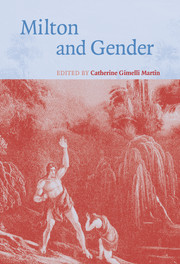Book contents
- Frontmatter
- Contents
- List of illustrations
- Notes on contributors
- Acknowledgments
- Abbreviations
- Introduction: Milton's gendered subjects
- PART I MASCULINITY, DIVORCE, AND MISOGYNY IN MILTON'S PROSE
- 1 The gender of civic virtue
- 2 The aesthetics of divorce: “masculinism,” idolatry, and poetic authority in Tetrachordon and Paradise Lost
- 3 Dalila, misogyny, and Milton's Christian liberty of divorce
- PART II THE GENDERED SUBJECTS OF MILTON'S MAJOR POEMS
- PART III GENDERED SUBJECTIVITY IN MILTON'S LITERARY HISTORY
- Index
2 - The aesthetics of divorce: “masculinism,” idolatry, and poetic authority in Tetrachordon and Paradise Lost
Published online by Cambridge University Press: 22 September 2009
- Frontmatter
- Contents
- List of illustrations
- Notes on contributors
- Acknowledgments
- Abbreviations
- Introduction: Milton's gendered subjects
- PART I MASCULINITY, DIVORCE, AND MISOGYNY IN MILTON'S PROSE
- 1 The gender of civic virtue
- 2 The aesthetics of divorce: “masculinism,” idolatry, and poetic authority in Tetrachordon and Paradise Lost
- 3 Dalila, misogyny, and Milton's Christian liberty of divorce
- PART II THE GENDERED SUBJECTS OF MILTON'S MAJOR POEMS
- PART III GENDERED SUBJECTIVITY IN MILTON'S LITERARY HISTORY
- Index
Summary
“though I am not the only person in Sussex who reads Milton,” wrote Virginia Woolf in a famous diary entry of September 1918,
I mean to write down my impressions of Paradise Lost while I am about it. Impressions fairly well describes the sort of thing left in my mind. I have left many riddles unread. I have slipped on too easily to taste the full flavour … I am struck by the extreme difference between this poem & any other. It lies, I think, in the sublime aloofness & impersonality of the emotion. [Milton] deals in horror & immensity & squalor & sublimity, but never in the passions of the human heart. Has any great poem ever let in so little light upon ones own joys and sorrows? I get no help in judging life; I scarcely feel that Milton lived or knew men & women; except for the peevish personalities about marriage & the woman's duties. He was the first of the masculinists: but his disparagement rises from his own ill luck & seems even a spiteful last word in his domestic quarrels. But how smooth, strong & elaborate it all is! What poetry! … The inexpressible fineness of the style, in which shade after shade is perceptible, would alone keep one gazing in to it, long after the surface business in progress has been despatched. Deep down one catches still further combinations, rejections, felicities, & masteries.
- Type
- Chapter
- Information
- Milton and Gender , pp. 34 - 52Publisher: Cambridge University PressPrint publication year: 2005

